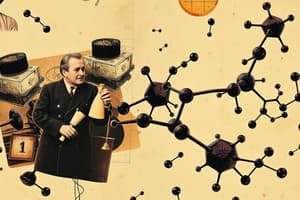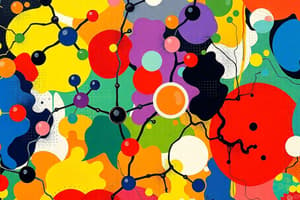Podcast
Questions and Answers
How do Course-Based Undergraduate Research Experiences (CUREs) benefit students?
How do Course-Based Undergraduate Research Experiences (CUREs) benefit students?
- By offering theoretical research projects only
- By isolating students from real research experiences
- By decreasing retention rates
- By integrating research into the curriculum and enhancing student understanding (correct)
What is the impact of implementing CUREs across undergraduate curriculums?
What is the impact of implementing CUREs across undergraduate curriculums?
- Fostering collaborative and innovative environments (correct)
- Isolating students from practical research experiences
- Decreasing students' understanding of biochemistry
- Reducing opportunities for students to engage with science
How do Active Learning Approaches, like CUREs, differ from traditional teaching methods?
How do Active Learning Approaches, like CUREs, differ from traditional teaching methods?
- They discourage graduates from pursuing careers in science
- They limit student engagement with the curriculum
- They guide students through real research projects (correct)
- They decrease student retention rates
What is the primary goal of fostering more collaborative and innovative environments through CUREs?
What is the primary goal of fostering more collaborative and innovative environments through CUREs?
How do CUREs contribute to preparing graduates for successful careers in science?
How do CUREs contribute to preparing graduates for successful careers in science?
Which molecules are the main focus of study in biochemistry?
Which molecules are the main focus of study in biochemistry?
What is the core purpose of biochemistry?
What is the core purpose of biochemistry?
What are some common roles that laboratory professionals with a biochemistry background can undertake?
What are some common roles that laboratory professionals with a biochemistry background can undertake?
Which skills are essential for biochemists to effectively carry out their responsibilities?
Which skills are essential for biochemists to effectively carry out their responsibilities?
What are some advanced technological platforms that biochemists use in their work?
What are some advanced technological platforms that biochemists use in their work?
What career progression path is mentioned for some biochemistry professionals?
What career progression path is mentioned for some biochemistry professionals?
Flashcards are hidden until you start studying
Study Notes
Understanding Biochemistry
Biochemistry is the interdisciplinary field exploring life's chemical processes, focusing on molecules such as carbohydrates, lipids, nucleic acids, and proteins. At its core lies the unraveling of interactions among these entities, pivotal to understanding cell structure and function, metabolism, and biological regulatory pathways.
Key Roles and Career Paths
Laboratory professionals, including biochemists and biophysicists, apply biochemistry principles to diverse areas. They develop diagnostic tools, design medicines, investigate environmental protection, and even contribute to translational research bridging lab findings and patient care. Some of these experts might begin their careers in temporary postdoc positions, progressing to professor roles or research and development positions within industry.
Professional Competencies
To effectively carry out their responsibilities, biochemists employ analytical, communication, critical-thinking, and time-management skills. Their daily routines involve planning complex projects, managing teams, isolating compounds, studying biological processes, and communicating findings. Additionally, they operate advanced technological platforms like lasers, fluorescent microscopy, X-ray crystallography, and computer modeling software to analyze macromolecular structures and biological dynamics.
Curriculum Development and Student Learning
Expanded access to research opportunities within undergraduate education supports student engagement and helps them identify as scientists. Course-Based Undergraduate Research Experiences (CUREs), for instance, integrate research into the curriculum, enhancing student understanding, increasing retention rates, and preparing graduates for successful careers in science.
Advances in Biochemistry Teaching Methods
As an active learning approach, CUREs allow instructors to guide students through real research projects, offering an immersive experience similar to that encountered in actual research labs. By implementing CUREs across undergraduate curriculums, educators create a pipeline fostering more collaborative and innovative environments, ultimately supporting students' transition into rewarding careers in the life sciences.
Studying That Suits You
Use AI to generate personalized quizzes and flashcards to suit your learning preferences.




